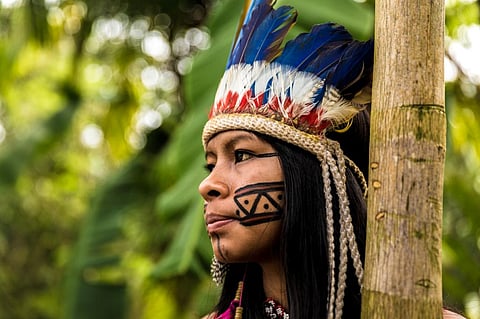

The threat to Amazon rainforest due to the changing climate and land-use has been perceived for several decades now and while there have been small victories in the fight to conserve the world’s green lungs, the severity of the recent calamities in the region have highlighted the need for urgent, efficient measures.
The dry conditions in Brazil, which has 66 per cent of the rainforest, began a month earlier this year than usual. Since September, the rainforests have witnessed around 7,000 wildfires, according to Brazil’s National Institute for Space Research. In the days that followed, it was clear that the the Amazon river basin was in the grip of a severe drought: The water level in River Negro, the largest tributary of the Amazon river, dipped to a historic low level at Port of Manaus in Brazil.
This indicates a global crisis since the Amazon basin carries a fifth of the world’s freshwater. And this is exactly what the Indigenous leaders at the ongoing 28th Conference of Parties to the United Nations Framework Convention on Climate Change (COP28) wants to call to the attention of policymakers.
“The Amazon rainforest is on fire and in a severe drought due to deforestation, extractive industries, industrial agriculture, climate change, and other threats,” noted Amazon Watch, a non-profit that works to preserve the forests and the rights of the indigenous people, in a media advisory. Amazon Watch will be at COP28 supporting indigenous voices from the region.
The organisation noted that the Indigenous leaders of the region want their rights over the forests to be protected and advanced on a war footing. Only then can the rich biodiversity of the Amazon and global climate be preserved. COP30 will be held in Brazil in 2025.
At this year’s annual UN climate change conference, the delegation of Amazonian Indigenous People is the largest among all indigenous delegations, and their call is ”The Amazon emergency is a climate emergency”. Through several events and deliberations, they want to strengthen their stand for ‘permanent protection of Indigenous territories’.
They will demand an end to industrial mining in ecosensitive regions like the Amazon, as well as a complete and urgent phase out of fossil fuels. They will join their counterparts from the rest of Amazon and other countries in their appeal for climate justice and a just energy transition.
“The delegation includes the Association of Indigenous Peoples of Brazil and the Coordination of Indigenous Organizations of the Brazilian Amazon, who plan to launch an Indigenous-led climate fund, the National Association of Ancestral Indigenous Women Warriors, and the Union of Indigenous Women from the Brazilian Amazon,” according to Amazon Watch.
The Indigenous women leaders of Brazil have also joined hands to ensure COP30 sees a strong participation of women climate activists in the leadership and policymaking.